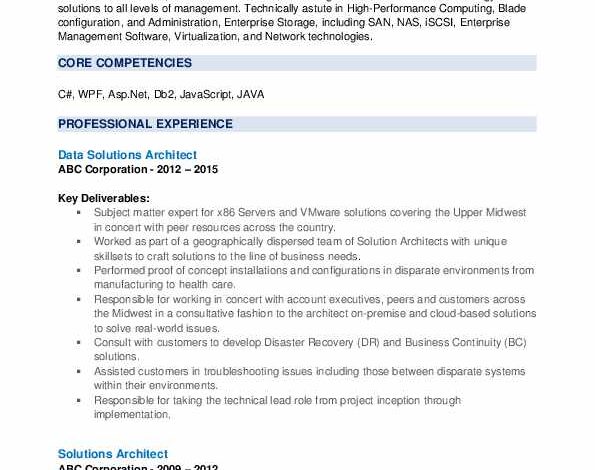The Role of a Solutions Architect in the Data Analytics Core

A Solutions Architect is an IT professional responsible for the design and development of data analytics solutions. They analyze data to provide insights, develop prototypes, and present the findings to stakeholders. They also provide technological leadership for the team. They analyze and evaluate third-party platforms and frameworks, oversee projects, and understand risks.
Qualifications
A qualified Solutions Architect in the Data Analytics Core will have hands-on experience building and deploying large-scale data analytics platforms. They should also possess excellent communication and leadership skills and have a strong technical background. These professionals will work with a variety of stakeholders, including executive stakeholders and data scientists.
Solutions architects play a vital role in the success of any data analytics project. In addition to strong technical skills, they should be good communicators and be able to work across diverse cultures. They should also be able to manage a project team and communicate their vision to key stakeholders.
Depending on their level of experience, solutions architects can earn several certifications. These credentials are available through community colleges and online programs. Some employers prefer candidates with at least a bachelor’s degree in computer science or information systems. Others prefer candidates with a master’s degree. Solution architects must be knowledgeable in the areas of big data, systems analysis, data architecture, and data management. Having hands-on experience in IT systems and software development is a plus.
A solution architect must have extensive experience in data analytics and have a thorough understanding of a company’s business and technological environment. They must be able to design and build the technical solution that will meet the needs of the organization. They should be passionate about data analytics and be able to clearly explain their concepts.
As the need for cutting-edge technology solutions increases, so does the need for solutions architects. Consequently, salaries for these professionals have become competitive. In addition to technical skills, solutions architects should have strong business acumen and a passion for their work. And a good salary to match.
A Solutions Architect is responsible for the development and implementation of an organization’s IT infrastructure. They work closely with business teams to understand business requirements and identify the best way to meet these needs. They also work with development teams to integrate new software with existing systems. And they must be able to communicate their recommendations to project management teams.
The role of a solutions architect is highly technical and requires a deep understanding of different technologies and software. Candidates should have a broad knowledge of various hardware and software applications as well as experience in data modeling and data warehousing. They must also have excellent communication skills and be able to explain their solutions in simple business terms. Additionally, they should be comfortable working with project management teams and other members of the team.
Duties
As a Solution Architect, you’re responsible for developing an organization’s IT infrastructure and working with various stakeholders, including management and product teams. You’ll understand business requirements and make recommendations for implementation methods and technology. You’ll also coordinate with software development teams and project management teams.
A successful Solution Architect has strong communication skills and will be able to translate complex technical requirements to non-technical stakeholders. They’ll also be responsible for managing expectations and delivering high-quality products. In addition, a Solution Architect will work closely with enterprise and software architects, business analysts, and project teams. It’s essential to be able to listen, consult, and empathize.
Often, a Solutions Architect is an experienced IT professional with a bachelor’s degree in computer science, information technology, or software information. They’ll also have extensive experience working with information technology systems and network administration. These skills are essential to the successful performance of this role.
As a Solutions Architect, you’ll be responsible for identifying the right tools and technologies for a data-driven analytics project. You must be comfortable with working with different cultures and delivering solutions in different environments. You’ll need to have strong communication and team management skills and have a passion for data analytics.
Throughout the sales process, a Solutions Architect will provide technical guidance for a project team. They’ll help clients understand the technology solutions and connect them to measurable business value. They’ll also be responsible for establishing technical standards, working with project teams, and developing software. This role requires a high level of technical expertise, so you’ll need to be self-motivated.
The salary for a Solutions Architect can range anywhere from $75,000 to $160,000 per year. Entry-level positions earn an average of $76,000 per year. Mid-level and experienced Solution Architects earn an average of $115,000 to $137,000 per year. The salary for this position will vary greatly depending on experience and location. Entry-level salary ranges are around $76,000 per year, while those with advanced degrees can earn up to $137,000 a year.
A Solutions Architect’s role is critical for a company’s digital transformation. Sometimes called the CIO of the future, the role encompasses many areas of IT, including security measures and microservices.
Certifications
As a Solutions Architect, you work on developing an organization’s IT infrastructure by developing and integrating software. You work with stakeholders and project management teams to translate requirements and design software solutions. Your goal is to achieve the desired business results and maintain a realistic budget for the project. You also analyze business needs to determine the best technology options and solutions for the company. You communicate findings and recommendations to stakeholders, and you collaborate with other teams to ensure a quality solution.
To succeed in this role, you need to have strong technical skills and hands-on experience. You also need to have excellent interpersonal and communication skills. You should be comfortable working with different cultures and interpreting the business needs of the stakeholders. Additionally, you must be able to effectively communicate complex technical concepts to non-technical team members. Finally, you must be able to work well with other teams, including developers, data scientists, and business analysts.
There are several certifications that solution architects can earn. Getting these certifications is a great way to showcase your knowledge of complex data sets, which will improve your career opportunities. Certifications in AWS services, for example, are useful for solution architects. However, it is not required for a solution architect to get certified in every service.
Solution architects must also have strong communication skills, because they must work with stakeholders from many departments. It is important for them to understand the business needs and communicate their vision clearly. They also need to collaborate with software and enterprise architects as well as business analysts and project management teams. They need to understand how stakeholders use the software and how to best address those needs. They must also be able to listen, advise, and empathize with stakeholders and other teams.
As a Solutions Architect in the Data Analytics core, you will be working closely with other members of the organization’s software development team. You will be working with the team to implement the solutions and products that Amazon provides. This position requires excellent communication skills and a high level of motivation.
Requirements
A Solutions Architect is a key member of an analytics team and has a variety of responsibilities. As a result, he or she must have strong technical skills and a breadth of experience. He or she should also be able to effectively communicate a vision to stakeholders and work with other members of the team to meet business objectives. The role also requires a good understanding of computer hardware and software, as well as a teamwork approach.
A Solutions Architect is responsible for developing new technologies and solutions to help organizations meet business goals. They work closely with key executives and project teams to create solutions that meet the business’ goals. They must be able to integrate existing systems and utilize technology in new ways to meet business needs. As a result, they must be able to communicate and collaborate with diverse teams and stakeholders, understand business processes, and control costs and assets.
A Solutions Architect is responsible for designing and developing data analytics solutions, and presenting the results to stakeholders. They must understand the technological and business environment to make informed decisions on which data analytics solutions will benefit the business. Additionally, a Solutions Architect should be passionate about data analytics and have excellent communication skills. They should also have experience building enterprise-class platforms.
Besides strong technical skills, a good Solutions Architect must have experience in software sales and collaboration with multiple stakeholders. He or she should be able to translate business requirements into technical solutions and work with cross-functional architecture teams and regional sales managers to ensure the quality of the solution. The ideal candidate for a Solutions Architect position will have a Bachelor’s degree in Computer Science or a related field and five to eight years of experience. Furthermore, he or she should have strong communication skills and have excellent leadership qualities.
A qualified Solutions Architect is capable of translating complex technical requirements into simple language that can be understood by non-technical team members. He or she will also be responsible for evaluating third-party platforms to ensure that they are appropriate for the company’s requirements. A qualified Solutions Architect will also be able to work with different departments and cultures to ensure a successful solution implementation.



